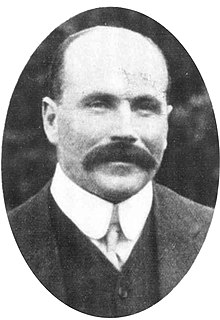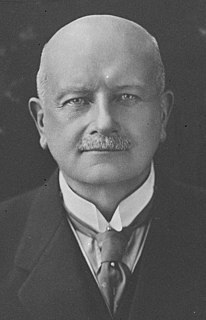Related Research Articles

David Robert Hall was a politician and lawyer in New South Wales, Australia.

James Sinclair Taylor McGowen was an Australian politician and the first Labor Premier of New South Wales from 21 October 1910 to 30 June 1913.

Sir Charles Gregory Wade KCMG, KC, JP was Premier of New South Wales 2 October 1907 – 21 October 1910. According to Percival Serle, "Wade was a public-spirited man of high character. His ability, honesty and courage were quickly recognized and, though he could not be called a great leader, he was either in office or leader of the opposition for nearly the whole of his political life of 14 years. His career as a judge was short, but his sense of justice and grasp of principles and details, eminently fitted him for that position."

Sir George Stephenson Beeby KBE was an Australian politician, judge and author. He was one of the founders of the Labor Party in New South Wales, and represented the party in state parliament from 1907 to 1912. He fell out with the party and later served as an independent, a Nationalist, and a Progressive. He left parliament in 1920 to join the state arbitration court, and in 1926 was appointed to the Commonwealth Court of Conciliation and Arbitration. He was Chief Judge from 1939 until his retirement in 1941.
Members of the New South Wales Legislative Assembly who served in the 25th parliament of New South Wales held their seats from 1920 to 1922. They were elected at the 1920 state election on 20 March 1920. The Speaker was Daniel Levy with the exception of 13–20 December 1921 when he was replaced by Simon Hickey.
Members of the New South Wales Legislative Assembly who served in the 23rd parliament of New South Wales held their seats from 1913 to 1917. They were elected at the 1913 state election on 6 December 1913.</ref> The Speaker was Richard Meagher.

Alfred Edden was a politician, trade union organiser and coal miner in New South Wales, Australia. He was a member of the New South Wales Legislative Assembly for more than 28 years, including 3 as Secretary for Mines. He was a foundation member of the Labor Party but left the party twice, in 1891 over the question of the solidarity pledge and was expelled in 1916 over the question of conscription.

William George Ashford was an Australian politician.

John Daniel FitzGerald was a politician, union official, journalist and barrister in New South Wales, Australia.

The McGowen ministry was the 34th ministry of the New South Wales Government, and was led by the 18th Premier, James McGowen. This ministry marks the first Labor ministry in the state of New South Wales.

The Holman ministry , first Holman ministry or Holman Labor ministry was the 35th ministry of the New South Wales Government, and was led by the 19th Premier, William Holman.

The Holman ministry , also known as the Second Holman ministry or Holman Nationalist ministry was the 36th ministry of the New South Wales Government, and was led by the 19th Premier, William Holman.

The Storey ministry was the 37th ministry of the New South Wales Government, and was led by the 20th Premier, John Storey.

Richard Thomas Ball was a politician and engineer in New South Wales, Australia.

Sir David Storey was an Irish-born Australian politician and businessman. He was a member of the New South Wales Legislative Assembly from 1894 to 1920 and the New South Wales Legislative Council from 1920 until his death in 1924, representing the Free Trade Party and its successors the Liberal Reform Party and Nationalist Party. He was Minister of Public Health in the Nationalist ministry of William Holman in 1919-20.
Members of the New South Wales Legislative Council who served from 1917 to 1920 were appointed for life by the Governor on the advice of the Premier. This list includes members between the election on 24 March 1917 and the election on 20 March 1920. The President was Fred Flowers. Connington appointed, Heydon died, Hill died, Fosbery died, McCaughey died, and Meagher resigned. </ref></ref>
Members of the New South Wales Legislative Council who served from 1910 to 1913 were appointed for life by the Governor on the advice of the Premier. This list includes members between the election on 14 October 1910 and the election on 6 December 1913. The President was Sir Francis Suttor. Hall appointed, Taylor appointed, Ross died, Hughes died, Hall resigned, </ref></ref>
A by-election was held for the New South Wales Legislative Assembly electorate of Sturt on 13 January 1917 following the resignation of John Cann who resigned to take the position of assistant commissioner of the New South Wales Government Railways. Cann had been elected as a Labor candidate at the 1913 election, however he was expelled from the party for voting against Labor's censure motion on 10 November 1916.
Burrangong, an electoral district of the Legislative Assembly in the Australian state of New South Wales was created in 1904 and abolished in 1920.
Surry Hills, an electoral district of the Legislative Assembly in the Australian state of New South Wales had two incarnations, from 1904 until 1920 and from 1927 until 1930.
References
- ↑ Part 3 Members of the Legislative Council (PDF). NSW Parliamentary Record. Parliament of New South Wales . Retrieved 26 November 2020.
- ↑ Part 10 Officers of the Parliament (PDF). NSW Parliamentary Record. Parliament of New South Wales . Retrieved 26 November 2020. [lower-alpha 1]
- ↑ "The PLL: State ministry censured". The Sydney Morning Herald . 27 April 1916. p. 9. Retrieved 24 July 2021– via Trove.
- ↑ "PLL expulsions". The Sydney Morning Herald . 7 November 1916. p. 7. Retrieved 7 May 2020– via Trove.
- ↑ "Proceedings in the Assembly: censure motion defeated". The Sydney Morning Herald . 11 November 1916. p. 13. Retrieved 7 May 2020– via Trove.
"No state crisis". The Sydney Morning Herald . 13 November 1916. p. 6. Retrieved 7 May 2020– via Trove. - 1 2 "The Labor conference". Singleton Argus . 30 January 1913. p. 4. Retrieved 14 August 2021– via Trove.
- ↑ "Mr F. H. Bryant, M.L.C." The Australian Worker . 1 September 1921. p. 12. Retrieved 8 August 2021– via Trove.
- ↑ "Mr. Travers' reply". The Sydney Morning Herald . 19 January 1926. p. 11. Retrieved 14 August 2021– via Trove.
